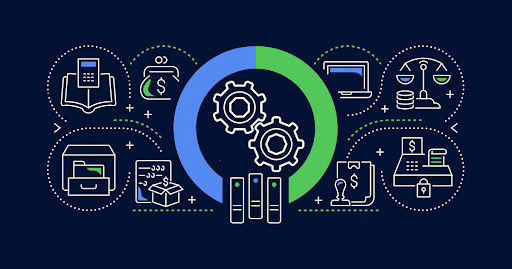Imagine a business in question lost a big order because they did not have enough cash to pay the advance to their supplier. This situation could have been avoided if they had good cash flow management in place through effective accounts payable and receivable solutions. Using professional platforms like Corcentric managed services to aid in optimizing accounts receivable and ensuring timely collection of payments, they would have had sufficient cash reserves to pay the advance to their supplier. Similarly, by negotiating favorable payment terms with their suppliers and prioritizing their payments, they could have managed their accounts payable effectively, reducing the cash outflow and improving their cash flow position.
Effective cash flow management is critical for businesses to remain liquid, avoid financial stress, and capitalize on growth opportunities. Liquidity is a critical aspect of financial management for small and mid-size businesses as it helps in paying for necessary operational expenses.
Financial management through AP & AR
Cash flow management involves monitoring and optimizing the inflow and outflow of cash to ensure that the company has sufficient liquidity to meet its financial obligations. The optimization of cash flow can be achieved through effective management of accounts receivable and payable.
Accounts Receivable Management
Effective management of accounts receivable involves billing customers promptly and collecting payments promptly. Small and mid-sized businesses can implement the following strategies to optimize their accounts receivable management:
Invoice Promptly
Sending invoices promptly after the delivery of goods or services is critical to maintaining a steady cash flow. Delaying invoicing can result in delayed payments and a cash crunch.
Monitor Payment Terms
It’s important to monitor payment terms and follow up with customers who do not pay within the stipulated time frame. This can be done through automated reminders or phone calls.
Offer Incentives
Offering incentives such as discounts for early payments can encourage customers to pay on time and reduce the average collection period. A good deed is appreciated and good customers who pay in time must be incentivized to show a business’s appreciation for their patronage.
Accounts Payable Management
Effective management of accounts payable involves managing supplier relationships, negotiating favorable payment terms, and optimizing payment timing. Small and mid-sized businesses can implement the following strategies to optimize their accounts payable management:
Negotiate Payment Terms
Favorable payment terms when negotiated with suppliers can help reduce the cash outflow and improve cash flow. For instance, negotiating a 30-day payment term can help businesses delay payments while maintaining supplier relationships.
Prioritize Payments
Prioritizing payments based on due dates and payment terms can help businesses avoid late payment penalties and maintain good credit scores. Credit scores take a plunge easily but they improve at a slower pace despite all the good work. Hence, it is imperative to take special care not to damage the creditworthiness of the business.
Use Electronic Payment Systems
Electronic payment systems such as online banking or mobile payments can help businesses streamline their payment process, reduce errors, and improve cash flow. Standing in the bank before a teller’s desk is a cumbersome task that tends to slow the entire process of the workflow.
Automation is the key
Automation can play a crucial role in managing cash reserves for small businesses and startups without a credit line to fall back on. By streamlining accounts payable and accounts receivable processes, automation can help businesses optimize cash flow, improve financial management, and reduce errors and inefficiencies. Here are four instances where automation can help in managing cash reserves for operations through accounts payable and accounts receivable services:
Automated Invoicing
Small businesses and startups can leverage automated invoicing solutions to send invoices promptly and reduce the time between delivering goods or services and receiving payment. Automation can help businesses generate invoices automatically, customize invoice templates, and send invoices via email or other electronic channels. For instance, cloud-based invoicing software such as Zoho Invoice or QuickBooks can help small businesses automate their invoicing processes, saving time and reducing errors.
Payment Reminders
Automated payment reminders can help small businesses and startups follow up with customers who have not paid their invoices on time. Payment reminders can be scheduled to go out at predefined intervals, such as one week or two weeks after the due date, and can be sent via email or other electronic channels. This can help businesses maintain a steady cash flow and reduce the need for manual follow-ups. For instance, software solutions such as Due can help businesses automate payment reminders and improve their accounts receivable management.
Electronic Payments
Small businesses and startups can benefit from electronic payment solutions that enable customers to pay their invoices online or via mobile devices. Electronic payments can help reduce processing times, minimize errors, and improve cash flow. For instance, payment processing solutions such as PayPal or Stripe can help businesses accept electronic payments, improving their accounts receivable processes and reducing the time between invoicing and payment.
Automated Payment Processing
Automated payment processing solutions can help small businesses and startups streamline their accounts payable processes, reducing the time and effort required to process payments. For instance, software solutions such as Bill.com can help businesses automate payment processing, reducing the need for manual data entry and reducing the risk of errors. This can help businesses improve their cash flow management, reduce late payment fees, and improve supplier relationships.
Conclusion:
Automation can play a crucial role in managing cash reserves for small businesses and startups without a credit line to fall back on. In the initial stages of business, it takes time for banks and other credit unions to recognize the ability of a business to pay back a loan in time. Hence, cash flow management benefits by automating invoicing, payment reminders, electronic payments, and payment processing, businesses can optimize their accounts payable and accounts receivable processes, reduce errors and inefficiencies, and improve their cash flow management. By investing in automation solutions, small businesses, and startups can improve their financial management, reduce financial stress, and capitalize on growth opportunities.






